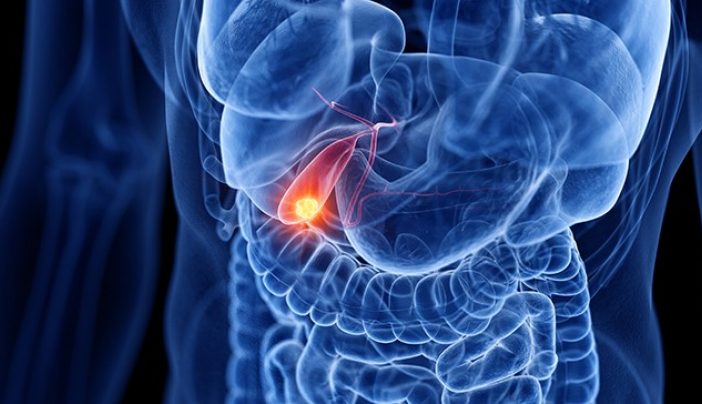
Overview
Gallbladder cancer is a rare but aggressive malignancy that arises in the gallbladder, a small organ under the liver that stores bile. It is often diagnosed late due to non-specific symptoms.
Symptoms
- Right upper abdominal pain
- Jaundice (yellowing of skin and eyes)
- Nausea and vomiting
- Unintended weight loss
- Fever
- Abdominal bloating or lump
Causes & Risk Factors
- Gallstones (most common risk factor)
- Chronic gallbladder inflammation (cholecystitis)
- Porcelain gallbladder
- Primary sclerosing cholangitis (PSC)
- Older age and female gender
- Ethnicity (higher in South America and South Asia)
Diagnosis
- Abdominal ultrasound
- CT scan or MRI
- Endoscopic ultrasound (EUS)
- ERCP or MRCP (to visualize bile ducts)
- Biopsy or fine-needle aspiration (FNA)
Treatment Options
- Surgery (cholecystectomy or extended resection for early stages)
- Chemotherapy (e.g., gemcitabine and cisplatin)
- Radiation therapy (adjuvant or palliative)
- Palliative care (for symptom control in advanced cases)
Prognosis
- Depends on stage at diagnosis
- 5-year survival:
- Localized: ~65%
- Regional: ~28%
- Distant: ~2–5%
Living with this Cancer Type
- Nutritional management and small frequent meals
- Pain relief and bile duct stenting if needed
- Emotional and family support
- Close follow-up and palliative consultation
Prevention & Screening
- Timely removal of symptomatic gallstones
- Monitoring porcelain gallbladder or PSC patients
- Healthy diet and weight control
- No standard screening for general population
FAQs
Q: Is gallbladder cancer related to gallstones?
A: Yes, long-standing gallstones are the most common risk factor.
Q: Is gallbladder cancer curable?
A: Only if diagnosed early and completely removed surgically.
Q: Can it be detected early?
A: Often difficult due to vague symptoms; imaging for other reasons may reveal it.
Resources
- American Cancer Society
- National Cancer Institute
- ClinicalTrials.gov
Understand Precision Testing
Learn how liquid biopsy and chemo sensitivity testing can personalize your treatment plan.
Make Informed Decisions
Gain knowledge to actively participate in treatment discussions with your healthcare team.
Improve Treatment Outcomes
Discover how precision medicine and metabolic therapies can enhance treatment effectiveness.
Start Your Educational Journey Today
Empower yourself with knowledge about precision metabolic oncology and take an active role in your cancer care journey.
Need More Information?
Our team of oncology experts is here to help you understand your diagnosis and treatment options.
